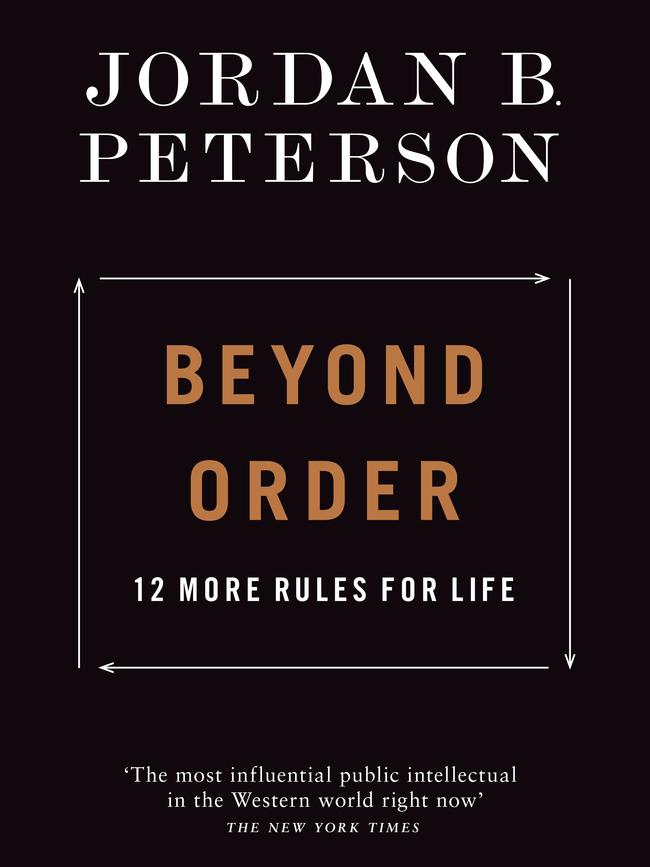Jordan Peterson: Meaning of life shaped by idiosyncratic personality
Jordan Peterson’s cheerless view of the universe makes him an anomaly among bestselling self-help authors.

Beyond Order: 12 More Rules for Life
By Jordan B. Peterson
Allen Lane, 432pp, $45 (HB), $35 (PB)
-
Jordan Peterson’s cheerless view of the universe makes him an anomaly among bestselling self-help authors. The genre tends to require a certain lobotomised optimism.
But as in 12 Rules for Life (which has sold five million copies), Peterson’s new book Beyond Order is replete with references to the “suffering and malevolence of life”, “the horror of the world”, “the tragedy and malevolence of the world” and so on.
This pessimism gives even his most platitudinous dating advice an existential piquancy. “There is not anyone out there who is perfect,” he advises, “just people who are damaged quite severely, although not always irreparably.”
The tragedy and suffering of the past year of Peterson’s life has presumably exaggerated this tendency in his thinking. Peterson has suffered the near-death of his wife from kidney cancer, descent into benzodiazepine addiction, ketamine use and a medically induced coma in a Russian hospital.
Peterson’s other great trauma has been the drama that has accompanied his rise from a quirky but unread Canadian psychology professor to the world’s most important conservative intellectual. He is reviled and celebrated for his criticism of identity politics and stern old-fashioned life advice.
Peterson owes his fame and notoriety to his YouTube videos, which have been watched more than 210 million times. YouTube is where he flourishes — his charisma, authority and dazzling spontaneous intellect make his video lectures addictive.
His prose is the opposite of addictive — repetitious, unvariegated, rhythmless, opaque and possessed of a suffocating sense of its own importance. It is a style that relies on readers knowing the author’s voice and supplying the cadences themselves. (Christopher Hitchens used the same trick, although more effectively.)
Ideas that flit and glimmer in Peterson’s videos look bloated and dead on the page. The internet favours personalities and Peterson is famous because of his personality, which is compelling, not because of his philosophy, which is bonkers. Curiously, though, the bonkers philosophy (a character called “the dragon of chaos” features prominently) is the foundation for rules that are often anticlimactically sensible.
The rules in 12 Rules for Life included, “Stand up straight with your shoulders back” and, “Make friends with people who want the best for you.” Beyond Order adds, “Plan and work diligently to maintain the romance in your relationship,” but also, “Do not hide unwanted things in the fog”.
I tend to believe society needs to be prodded by bonkers, renegade intellectuals such as Peterson. It does not follow that we are required to take his thinking seriously.
Indeed, the suspicion raised by Beyond Order is that Peterson may have mistaken his personality for a philosophical system. Beyond Order nails together shower thoughts, random prejudices and genuine insights. The book encompasses attacks on political correctness and advice about buying your girlfriend lingerie.

Under all this clutter, Peterson’s philosophy concerns the human need for meaning. His question is an old one: If society has lost faith in God and there is therefore no religion to provide us with a larger sense of purpose, then where do we derive our meaning from? Not, Peterson argues, from within ourselves. He hates the postmodern relativist idea that individuals generate their own values — the result is chaos. However, he is nevertheless attracted by the drama of individualism. This is why Nietzsche and Heidegger are never far from his thoughts. Both philosophers would have been able to get on board with Beyond Order’s Rule II: “Imagine who you could be then aim single-mindedly at that.”
So, how to get individualism without relativism? To solve this problem Peterson calls in his hero, “psychoanalyst extraordinaire” Carl Jung, whose theory of the collective unconscious proposes that myths and stories in the culture at large offer clues to universal human attributes, desires and fears. This licences Peterson to hunt down these clues to construct a philosophy of the meaning of life.
The predictable flaw is that Peterson’s readings of these myths are shaped by his idiosyncratic personality. Harry Potter, the Bible, Egyptian myths and Sumerian legends are polished into flattering mirrors for the Jordan Peterson view of the meaning of life, which, unsurprisingly, is just the sort of pessimistic heroic individualism you might expect from a baby boomer who grew up in remote Canada in the 1970s reading too much Nietzsche.
The Times
James Marriott is deputy books editor of The Times.
Beyond Order: 12 More Rules for Life
By Jordan B. Peterson
Allen Lane, 432pp, $45 (HB), $35 (PB)



To join the conversation, please log in. Don't have an account? Register
Join the conversation, you are commenting as Logout